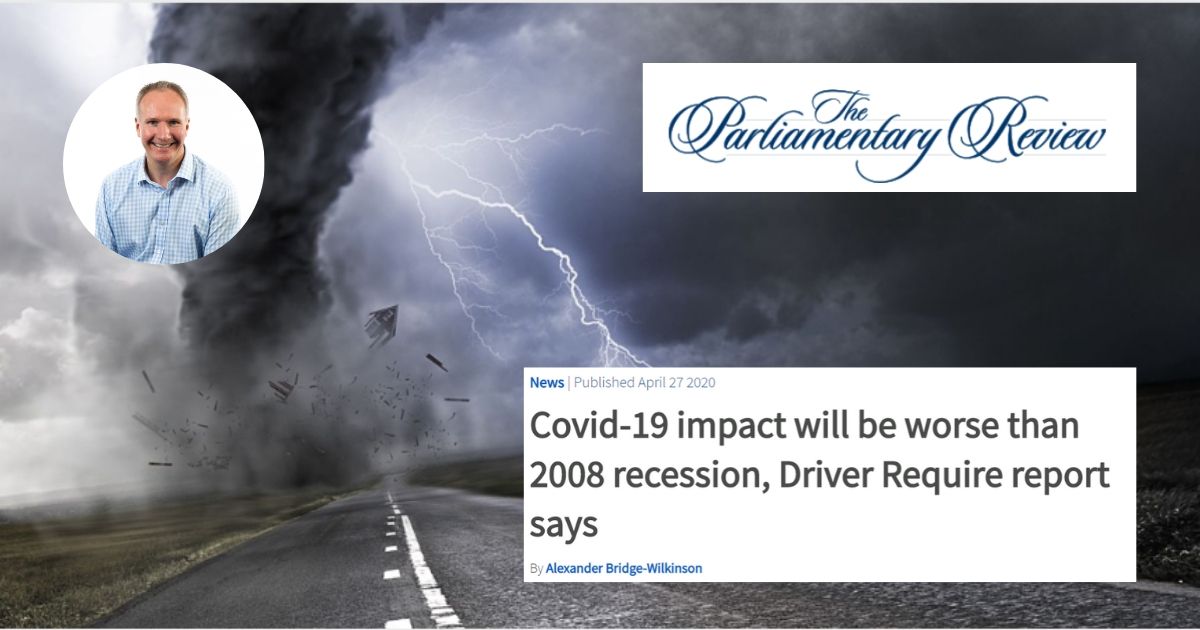Covid-19 impact will be worse than 2008 recession, Driver Require report says
Read our article in the Parliamentary Review

Specialist driver recruitment agency Driver Require has released an in-depth analysis on how the Covid-19 pandemic will affect the economy, speculating that a U-shaped global recession is the most likely outcome, and it may take until 2025 for GDP to return to pre-pandemic levels.
The three-part report presents forecast data which projects the likely consequences of the pandemic for the UK economy as a whole, before proceeding to lay out the impact on the haulage and logistics industry in focus.
In this article, The Parliamentary Review explores the first section of the report, which addresses the current Covid-19 pandemic and Driver Require’s forecasts for the social and economic crisis which will follow. The report explores how the economic downturn is likely to evolve over time before offering its conclusion on the most likely recovery scenario.
The analysis suggests that the Covid-19 crisis is unique in nature since there are restrictions both in supply and demand, with similarities drawn between the economic conditions of now and those immediately following the Second World War.
According to the report, all recessions in modern times have been brought about by a lack of demand and have traditionally been resolved with more liquidity being injected into the economy to encourage greater spending and with it, economic growth. In this case, the report speculates that this may not happen with both supply and demand impacted simultaneously.
The report goes on to highlight recent Purchasing Managers’ Index [PMI] numbers.
With regards to typical PMI numbers, a benchmark of 50 represents 'business as usual', with anything above 50 indicating growth and anything under 50 showing a contracting market.
Alarmingly the latest PMI score logged for March 2020 had dropped to 36, down from 53 in February.
The sudden PMI drop-off is the sharpest decline seen since the PMI index was first launched in July of 1996. The previous lowest UK score recorded coincided with the 2008 recession, with PMI falling to 38.1 in November 2008.
Already, therefore, the Covid-19 PMI decline has already surpassed 2008 numbers and the report suggests that this fall is likely to intensify in April until the UK lockdown is lifted.
Meanwhile, over in the Eurozone, its PMI has fallen from 52 to 30 between February and March 2020, which implies that Eurozone GDP will fall by two per cent per quarter.
Addressing the UK forecast for GDP, Driver Require CEO Kieran Smith said that it too is already worse than in 2008 and indications are that “it will worsen until we are out of lockdown”.
Quoting figures from the report, Smith said: “Average forecast figures are -14 percent for the second quarter of 2020 and -7 per cent across the year, which is more rapid and severe than the 2008 decline of -6.3 per cent.”
With no precedent for managing a decline of such magnitude, Smith suggests that epidemiologists may be in a more advantageous position to predict the economic outcomes than economists themselves.
Smith said: “We are waging war on a microbe, a deadly virus, and our challenge is to prevent mass deaths while propping up the economy to make sure it survives the crisis. No-one has ever had to do this in modern times.
“To summarise, the biggest issue we are facing is that we don’t have a model for how to tackle this crisis, nor do we know how it will unfold; economists are trained and accustomed to forecasting GDP growth to within a 0.2 per cent accuracy, yet we are receiving forecasts from acknowledged experts that vary by tens of percentage points. We are into unchartered territory, where epidemiologists may be better positioned to predict the economic outcomes than economists.
“Economic forecasts for the second quarter of 2020 vary significantly, however the common conclusion is that this is grave”.
The Driver Require report also suggests that the Office for Budget Responsibility’s analysis of the post-crisis recovery period is overly optimistic.
The report reads: “We note the recent analysis released by the Office for Budget Responsibility [OBR] on April 14, which predicts a -35 per cent drop in GDP in Q2 2020 rising quickly back up to result in a -13 per cent fall in annual GDP in 2020.
“This is at the top end of previous predictions, which is not surprising as it assumes a three-month lock-down with a three-month recovery phase, this being more severe than the assumptions in the other forecasts. The OBR emphasises that this is not a ‘forecast’ but a ‘reference’ scenario, to be used ‘as a reference point against which to monitor incoming data and other information.’
“The OBR states that the ‘scenario should not be taken as our view of the most likely path for the economy'. This makes sense as it omits to include the possibility of a global recession, international trade disruption and international supply chain dislocation, so offering an unrealistically optimistic view of the post crisis period.”
Smith acknowledged that public health currently remains the highest priority for the government, but went on to explain that eventually, the Covid-19 crisis will reach a stage where the social and economic consequences of a prolonged recession become the greatest concern and politicians will be forced to manage that.
In Smith’s view, one of the greatest factors for the economic outlook and also one of the biggest questions for politicians will be when the UK lockdown finally ceases.
His analysis reads: “The fundamental issue we are facing now is when can we end the lock-down and resume ‘business as usual’.
“Ending the lockdown will require careful judgement of when the health imperatives need to give way to economic concerns. Health is, quite rightly, highest priority today, but we will get to a point where the social and economic consequences of a prolonged recession become the greatest concern.
“This will be no easy decision for politicians who require popular support to keep them in power in the short term but realise the need to sustain the economy to remain in power in the medium term.”
What the report does make clear is that the longer the lockdown is in place, the worse and longer-term the recession is likely to be. It also suggests that the recovery will depend on how well the spread of Covid-19 can be controlled, meaning the lifting of the lockdown is likely to be a phased process.
The report reads: “Any recovery will be constrained by how well the virus is controlled, which is likely to take years rather than months.
“Even if we do end the lock-down, it will have to be gradual, starting with key sectors, such as manufacturing and vital services, then progressing to small businesses and ultimately recreational services, such as restaurants, theatres and gyms. Either way it will be a slow process.”
The next key factor which the report highlights is the effect the recession will have on businesses and whether the government will be able to continue to support them as it is doing now.
“Once we start lifting the lock-down restrictions, the next factor will be the cumulative effect on the population and on businesses, and how long it will take them to recover. If the government cannot sustain the financial support for the community and for businesses due to an extended lock-down, then there will be catastrophic levels of unemployment and business closures, meaning it will take months if not years for the labour market to recover.
“Even with continued government financial support, it will not be easy to get businesses back up and running, as they will be dependent on all links in their supply chain being operational. This will be far from the case, especially considering that many of their international suppliers will be in regions that are at different stages of the war against Covid-19 and may not yet be able to supply critical parts or services.”
Smith’s analysis also surmises that consumer spending power will be significantly reduced along with an increased debt burden for businesses, while banks will also become more risk averse and are likely to restrict lending.
So, what does this mean for the economy’s long-term prospects?
The report adds: “This pretty much counts out the possibility of a V-shaped recession, which requires a quick rebound. The same applies to a W-shaped recession, which again would require a quick rebound after the second dip.”
It is Smith’s belief, therefore, that the UK economic recovery will take on an initial V-shape, before becoming a U-shaped recession in the longer term.
He said: “It is my belief that we will face a V-shaped partial recovery in late 2020 as we come out of full lockdown, followed by a U-shaped recession in the longer term. But this initial recovery will not be nearly enough to offset the massive drop in GDP in Q2, and GDP may not return to pre-pandemic levels until between 2023 and 2025.”
Even the idea that GDP could reach pre-pandemic levels within three to five years is nonetheless an “educated guess”, according to the report itself.
In support of this prognosis, the report quotes a series of surveys carried out by Focus Economics, highlighting that economists from 75 different institutions worldwide foresee a longer global recession due to the pandemic.
According to an April 15 survey, 20 per cent of the economists polled said that there will be a V-shaped recession, with 65 per cent predicted a U-shape. This compares with 28 per cent who polled V-shape and 58 per cent U-Shape just two weeks earlier.
To further support this conclusion, International Monetary Fund chief Kristalina Georgieva said on April 9 that the Covid-19 situation would turn global economic growth sharply negative and only a partial recovery would come during 2021.
Georgieva has suggested that hundreds of billions of dollars of foreign aid will be required to aid emerging markets and developing countries worst affected by the crisis, revealing that 170 of the 189 IMF member nations would see negative per capita income growth this year.
Shockingly, just three months ago, 160 of the 189 IMF nations were expected to yield positive per capita income growth during 2020, meaning the Covid-19 situation has completely turned the situation on its head.
Elsewhere, the more resilient Eurozone nations such as Germany are likely to have their hands full absorbing the economic shock inflicted on the southern countries.
The macro-factor of oil prices is also brought up in the report. Oil prices have fallen since OPEC agreed to slash global production, with US oil prices slipping into negative numbers earlier in April. Sustained low oil prices will have a significant knock-on effect on the Middle Eastern economies, while the US is also likely to slip into recession itself, which will further exacerbate the adverse impact on the global economy.
In sections two and three of Driver Require's report which are set to be released over the coming weeks, it goes on to interpret in detail the impact that the economic downturn will have on hauliers and temporary recruitment agencies.
The article from The Parliamentary Review can be read in full here
Google Reviews
-
 Dave GallacherGood range of jobs available, decent rates of pay. Always able to get in contact with the office or someone on call with good knowledge and understanding of the job or role sent to. Never had an issue with pay, easy timesheet process
Dave GallacherGood range of jobs available, decent rates of pay. Always able to get in contact with the office or someone on call with good knowledge and understanding of the job or role sent to. Never had an issue with pay, easy timesheet process -
(1).png?r=a2-s120.120-o) Ionel Lucian DinicaVery easy to find work , very nice and kind staff, all details explained very easy. Highly recommended.
Ionel Lucian DinicaVery easy to find work , very nice and kind staff, all details explained very easy. Highly recommended. -
 Catalin SirgheA reliable and efficient agency. I’ve had a positive experience with Driver Require. They have consistently paid on time and have never cancelled a shift. The communication is excellent. If you’re looking for a reliable agency that values its drivers, Driver Require is a great choice.
Catalin SirgheA reliable and efficient agency. I’ve had a positive experience with Driver Require. They have consistently paid on time and have never cancelled a shift. The communication is excellent. If you’re looking for a reliable agency that values its drivers, Driver Require is a great choice.
